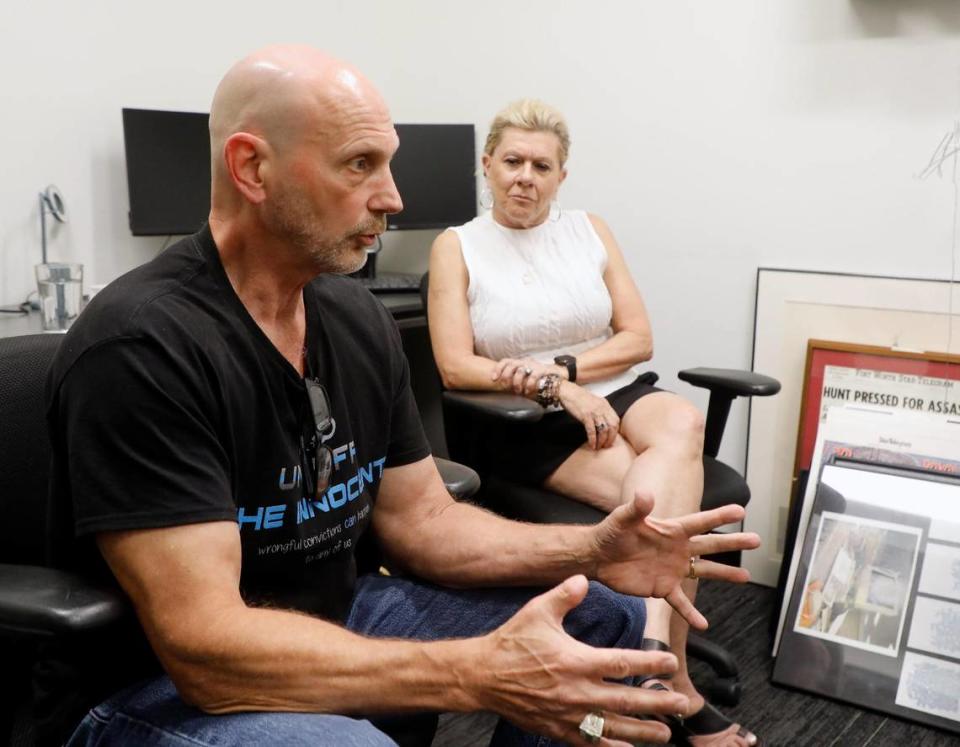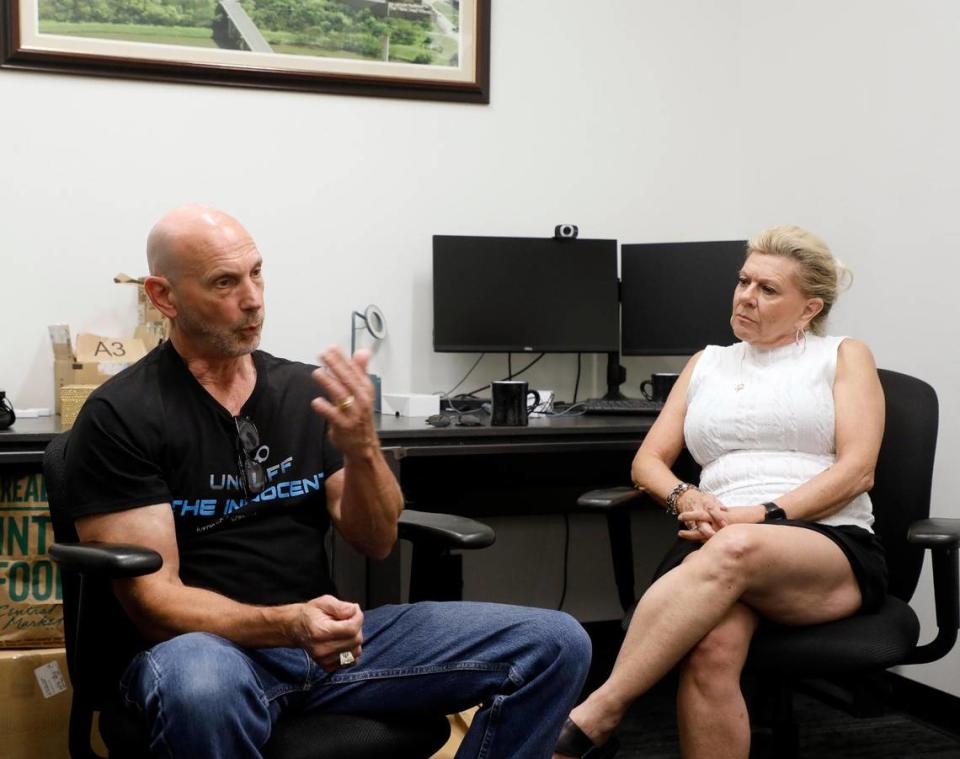A jury declared him not guilty after 21 years in prison. Texas still won’t compensate him.
In 2016, Brian Franklin walked across the street from the Tarrant County Jail and tried to enjoy his first breaths of free air in 21 years. The joyous moment was impeded by the four hefty red mesh bags Franklin hauled across Belknap Street that were stuffed with legal documents.
After two jury trials, two appeals hearings, two Court of Criminal Appeals rulings and 20 years of legal work on his case, Franklin’s bundles of records weighed the gaunt 58-year-old down — and they continue to do so.
Franklin was convicted of sexual assault in 1995 after a friend’s 13-year-old daughter accused him of raping her. He was sentenced to life.
His parents and siblings wanted him to have top-notch representation. Mike Ware, who later founded the Innocence Project of Texas, represented Franklin in his first jury trial. Dick DeGuerin, who most recently was a top prosecutor in the impeachment case against Attorney General Ken Paxton, represented Franklin in several of his appeals.
A Tarrant County jury found Franklin not guilty at a retrial in 2016.
Franklin’s acquittal was a moment of celebration for him and his family after 21 years in prison.
“He lost — when you say lose everything, he lost everything except the beat of his heart,” Franklin’s wife, Karyl Franklin, said. “That is the only thing he walked out of that prison with was a beating heart.”
Although he was acquitted, Franklin is still not innocent in the eyes of the state.
As a result, the state has denied Franklin’s requests for financial compensation for his 21 years in prison because they say he has not been ruled innocent — he has only been ruled not guilty. Based on Texas law, Franklin could be entitled to almost $1.7 million.

To Franklin, his family and his attorneys, his case reveals a contradiction in Texas’ compensation law and is another injustice against him.
“He spent 20 years in a stinking prison cell for a crime he didn’t commit and he was labeled with being a child rapist, which is the lowest of the low. He was mistreated every day he was in prison,” DeGuerin said. “He deserves compensation.”
The woman Franklin is accused of sexually assaulting as a child has never recanted her allegation. The Star-Telegram was not able to contact her.
The Tarrant County Criminal District Attorney’s Office also maintains Franklin’s guilt.
“Brian Franklin has not been exonerated or found actually innocent by any court. In 2017, our office opposed Franklin’s attempts to get the trial court to declare him actually innocent. We remain in opposition,” District Attorney Phil Sorrells said via email through communications officer Anna Tinsley Williams.
Life sentence and appeals
Franklin filed his first writ of habeas corpus, or claim of innocence, in 1999 based on new evidence that had come out about his conviction.
During testimony at Franklin’s 1995 trial, the girl said she had not had any sexual encounters with anyone before Franklin. After Franklin’s conviction, her stepfather was charged and later convicted of sexually abusing the girl since she was 6 years old. Her testimony that the assault by Franklin was the first time she had been sexually abused was considered perjury.
The stepfather was later sentenced to 10 years of probation after pleading guilty to injury to a child.
When habeas corpus claims are filed, the claim goes before a judge, who can deny or grant a trial and make a recommendation in the case to the Texas Court of Criminal Appeals.
In 2000, Judge Wayne Salvant oversaw Franklin’s appeals hearing. Franklin’s attorneys presented a variety of inconsistencies in the initial case against him and noted that almost all of the evidence presented at Franklin’s trial was likely inadmissible. The evidence that the girl had physical and psychological signs of sexual abuse could now be attributed to her stepfather’s abuse, not Franklin.
At the end of the appeals hearing, the chief prosecutor in Franklin’s 1995 conviction, Rose Anna Salinas, remarked that, “... to find out years later that this information has now come forward and that there is someone in prison who possibly is innocent is very, very serious to me.”
“I thought I could elevate that case properly to prosecute it,” Salinas said, according to court documents. “And obviously I was wrong.”
Salvant recommended Franklin have a retrial based on the new evidence.
But the Court of Criminal Appeals disagreed. In 2002, it denied Franklin’s habeas corpus appeal, saying he had not proved he was innocent, only that a jury might rule differently in a retrial.
In 2014, the process essentially repeated itself. Franklin filed a writ of habeas corpus, this time specifically based on the claim that he had been denied a fair trial. In 2014, a Tarrant County court again heard the case in an appeals hearing. The court emphasized Salinas’ testimony from the 2001 appeals hearing that “the bottom line is this jury verdict cannot be trusted because of the false information.” Again, Franklin’s claim of innocence was granted.
This time, the Court of Criminal Appeals agreed. In 2016, the appeals court ruled that Franklin’s conviction should be thrown out; not based on “actual innocence,” but because his conviction was based on false testimony.
The appeals court ordered a retrial before a Tarrant County jury. Prior to the trial, the DA’s office offered Franklin a plea deal: no trial, and he would be given time served. He refused.
He told the Star-Telegram he did not just want to get out of prison — he wanted the courts to admit he was innocent.
A Tarrant County jury delivered the not guilty verdict just in time for Christmas of 2016; Franklin’s family dubbed the holiday “Acquittmas.”

In response to questions regarding Franklin’s case and the false testimony in the first trial, Salinas emailed a statement on Sept. 27 to the Star-Telegram through Tinsley Williams. She said the girl later explained why she did not disclose the sexual abuse by her stepfather before Franklin’s initial trial.
“She did not intentionally withhold evidence of this sexual abuse. She was in great fear of her stepfather. Later, I had the opportunity to meet with the injured party. She has never recanted that Brian Franklin sexually assaulted her and I do believe he is guilty of this crime,” she said.
A question of ‘actual innocence’
Franklin’s fight over compensation is not entirely unique; Alfred Dewayne Brown’s 2005 murder conviction, in which he was given the death sentence, was overturned in 2014 by the Court of Criminal Appeals. But the state comptroller’s office denied Brown compensation, arguing that the trial court had not formally declared Brown “actually innocent.”
That “actual innocence” is the snag in Franklin’s case.
Texas has one of the most generous wrongful conviction compensation laws, where a wrongfully convicted person can receive up to $80,000 for each year they spent in prison. But, either the Court of Criminal Appeals or a district attorney has to dismiss someone’s case based on actual innocence in order for them to qualify.
In July 2018, the state comptroller denied Franklin’s compensation claim. According to the denial, no court has found Franklin “actually innocent.”
The Court of Criminal Appeals’ ruling says Franklin’s wrongful conviction was based on false testimony, not Franklin’s “actual innocence.” The 2016 trial court found him not guilty, but a not guilty ruling is not the same as innocence.
Franklin appealed the compensation denial to the Texas Supreme Court. In a petition in August 2019, his attorneys argued that the Court of Criminal Appeals’ 2016 ruling implicitly found Franklin innocent because it affirms the trial court’s not guilty ruling.
“The question of my innocence is not even a question anymore. It’s been decided by the court by the jury in the retrial,” Franklin said. “You ask anybody if they know anything about my case, everybody agrees I’m innocent. What is the problem?”

‘The courts should be respected’
After the court of appeals’ ruling, the Tarrant County District Attorney’s Office decided to retry Franklin. Franklin’s attorneys criticized that decision, saying the case should have been dismissed.
In April 2016, DeGuerin told the Star-Telegram that then-Tarrant County DA Sharen Wilson should drop the case and declare Franklin innocent. Instead, Wilson ordered the retrial.
In the Brown case, the opposite happened.
In 2018, Harris County District Attorney Kim Ogg released a statement saying that Brown, the death sentence exoneree, was “actually innocent.” The Texas Supreme Court subsequently ruled against the state comptroller and granted Brown his compensation of nearly $2 million.
Wilson did not respond to the Star-Telegram’s requests for comment.
According to DeGuerin, current Tarrant County DA Sorrells could make the same difference in Franklin’s compensation case by declaring his innocence.
“The Tarrant County DA should have — when it was reversed by writ of habeas corpus — they should have confessed he was innocent and not re-tried it. And now they should say he was actually innocent.“ DeGuerin said. “It’s sour grapes and they ended up with egg on their face and don’t want to admit it.”
DeGuerin and Ware said wrongful conviction compensations should be granted based on “not guilty” verdicts, not on an actual innocence ruling. By refusing to fully exonerate Franklin, Ware said, the state and Tarrant County DA’s office are refusing to respect a jury’s decision.
“The courts say we respect the jury finding that person guilty and we aren’t going to tinker with that,” Ware said. “And it seems to me that the reverse should be true as well, that the courts should be respected when they find someone innocent.”
Franklin plans to petition the Board of Pardons and Paroles for a governor’s pardon based on actual innocence. Doing so should clear his path to receive compensation. He also wants the Tarrant County DA’s Office to have the county’s Conviction Integrity Unit take a look at his case.
To bolster compensation laws, Ware said, the Texas Legislature should update the requirements so those whose convictions have been reversed on any grounds — not just actual innocence — would qualify for compensation.
‘A debt by the state’
Before his 1995 conviction, Franklin was a Fort Worth police officer.
Since his release from prison, Franklin has not been able to get another job at a police department; he believes because the stigma of the conviction follows him. He works now at a prison, supervising the men whose position he was once in.

He and his wife, who met four years ago, still cannot quite move on because of the fight over compensation.
“It’s a debt by the state that’s owed to me,” Franklin said. “There’s no question about it.”
Franklin believes the Tarrant County District Attorney’s Office should send his case to the county’s Conviction Integrity Unit, as he says they should have done decades ago. The integrity unit could make a recommendation on the case to the DA.
At the time of his conviction, Franklin didn’t just believe in the criminal justice system; he upheld it.
But while in prison, Franklin met multiple incarcerated people that he believes are innocent.
The Texas Innocence Project estimates that Texas prisons contain 3,000 to 9,000 innocent people, which is about 2% to 6% of the total prison population.
“All it takes is a false accusation and a poor investigation,” Franklin said.

